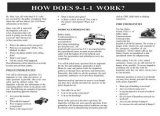9-1-1 (nine-one-one) is for reporting emergency events only. Law Enforcement, Fire, and Medical resources will be sent out directly when there is an immediate threat to life or property.
If you are unsure about what you are reporting is an emergency, call 9-1-1 and assistance will be dispatched to the most critical situations first.
9-1-1 should also be called when there is a good chance of arresting a crime suspect or preventing the development of a serious crime situation by reporting suspicious persons, vehicles, or circumstances, threats of violence or injury, escalating disturbances or actions which if not controlled quickly could lead to an emergency.
9-1-1 calls from land line phones are automatically sent to the emergency dispatch center via dedicated phone lines and receive priority answering. A database display linked to 9-1-1 calls shows caller location and phone number information to the 9-1-1 dispatcher. Calls requesting fire/medical support will be transferred promptly to the appropriate dispatch facility of jurisdiction, along with the accompanying 9-1-1 data display. The 9-1-1 dispatcher will remain on the line until communication has been established with the receiving dispatch center. If there is a situation where the caller hangs up, the 9-1-1 dispatcher will immediately provide the fire/medical dispatcher with the location and nature of the call.
Wireless 9-1-1 calls from cellular phones are initially received at the California Highway Patrol's (CHP) dispatch facility in Benicia, CA. The CHP dispatcher will route law enforcement calls for service to the Sheriff's dispatch center via dedicated phone lines.
